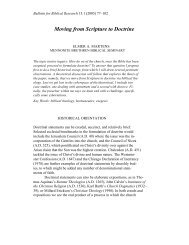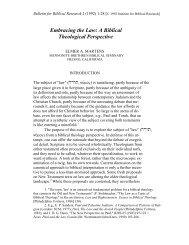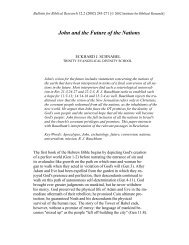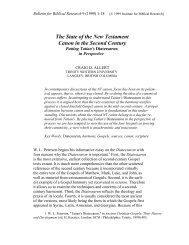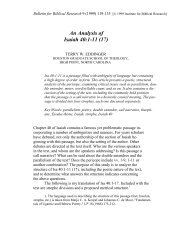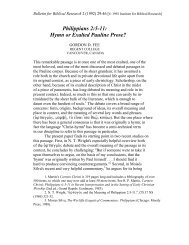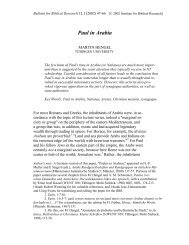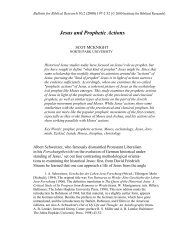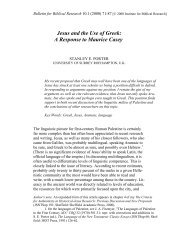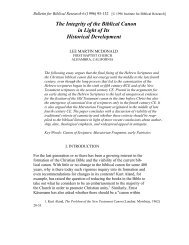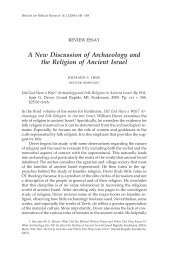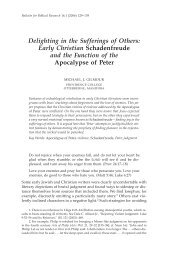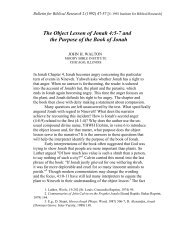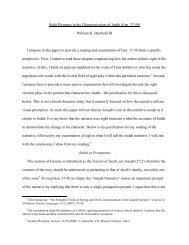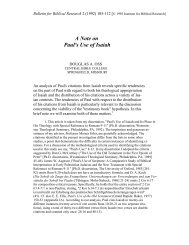Beyond the Grave - Institute for Biblical Research
Beyond the Grave - Institute for Biblical Research
Beyond the Grave - Institute for Biblical Research
Create successful ePaper yourself
Turn your PDF publications into a flip-book with our unique Google optimized e-Paper software.
BLOCK: Ezekiel's Vision of Death and Afterlife 121<br />
and small, have experienced <strong>the</strong> same fate (32:31). In view of <strong>the</strong> ex-<br />
pository nature of 32:17-32, we may focus our attention here.<br />
Structurally 32:17-32 is complex. 50 Following <strong>the</strong> opening date no-<br />
tice, Yahweh commands Ezekiel to wail <strong>for</strong> <strong>the</strong> hordes of Egypt and to<br />
bring <strong>the</strong>m down to <strong>the</strong> ne<strong>the</strong>rworld (vv. 17-18). This charge serves as<br />
a <strong>the</strong>sis type statement, introducing <strong>the</strong> reader to <strong>the</strong> <strong>the</strong>me of <strong>the</strong> or-<br />
acle. Vv. 19-21 constitute a general announcement of judgment upon<br />
<strong>the</strong> nation, highlighting <strong>the</strong> depths to which she shall fall. The bulk of<br />
<strong>the</strong> oracle (vv. 22-30) is taken up with a roll call of nations that greet<br />
Egypt upon her arrival in Sheol. The passage concludes with a state-<br />
ment of <strong>the</strong> significance of <strong>the</strong> previous scenes <strong>for</strong> Pharaoh (v. 31), and<br />
a <strong>the</strong>ological interpretation of <strong>the</strong> descent of <strong>the</strong> king of Egypt (v. 32).<br />
The problematic state of <strong>the</strong> text complicates <strong>the</strong> interpretation<br />
of <strong>the</strong> prophecy. Not since <strong>the</strong> prophet's opening vision have trun-<br />
cated sentences and inconsistencies of gender, number, and tense so<br />
plagued a passage. 51 Compounding <strong>the</strong> issue is a stylistic monotony,<br />
which some would say ill befits <strong>the</strong> prophet so renowned <strong>for</strong> his lit-<br />
erary power. The pool of words and expressions is limited, but its<br />
heavy dependence upon stock phrases associated with death and<br />
burial contributes to its morbid tone. But <strong>the</strong> issue <strong>for</strong> us is, what<br />
does this text tell us about Ezekiel's view of life after death?<br />
The Topography of <strong>the</strong> Ne<strong>the</strong>rworld<br />
We do well to begin our discussion of Ezekiel's understanding of <strong>the</strong><br />
ne<strong>the</strong>rworld with a look at its relationship to <strong>the</strong> rest of <strong>the</strong> universe.<br />
Like his fellow Israelites, Ezekiel assumed a universe divided into<br />
three tiers: 52<br />
_______________________________<br />
Heaven: The Realm of Deity 53<br />
_______________________________<br />
Earth: The Realm of <strong>the</strong> Living 54<br />
_______________________________<br />
Sheol: The Realm of <strong>the</strong> Dead<br />
________________________________<br />
50. Perhaps a consequence of <strong>the</strong> grief poem (nĕhî) genre, on which see R. M.<br />
Hals, Ezekiel (Forms of Old Testament Literature 19; Grand Rapids: Eerdmans, 1989)<br />
228-29.<br />
51. Cf. <strong>the</strong> number of diversions from MT in LXX.<br />
52. Cf. Bernhard Lang's discussion of <strong>the</strong> relationships among <strong>the</strong> tiers ("Life<br />
After Death in <strong>the</strong> Prophetic Promise," Congress Volume: Jerusalem 1986 [VTSup 40; ed.<br />
J. A. Emerton; Leiden: Brill, 19881 145-48).<br />
53. The word šāmayim occurs eight times in <strong>the</strong> book, but only in 1:1 does it de-<br />
note <strong>the</strong> realm of deity.<br />
54. Identified in Ezekiel as ’eres hahayyîm, "<strong>the</strong> land of <strong>the</strong> living" (26:20; 32:23,<br />
24, 25, 26, 27, 32). This is <strong>the</strong> sphere in which humans live and in which <strong>the</strong>y inflict<br />
terror upon one ano<strong>the</strong>r (cf. 32:23, 24, 25, 26, 27, 30, 32).



